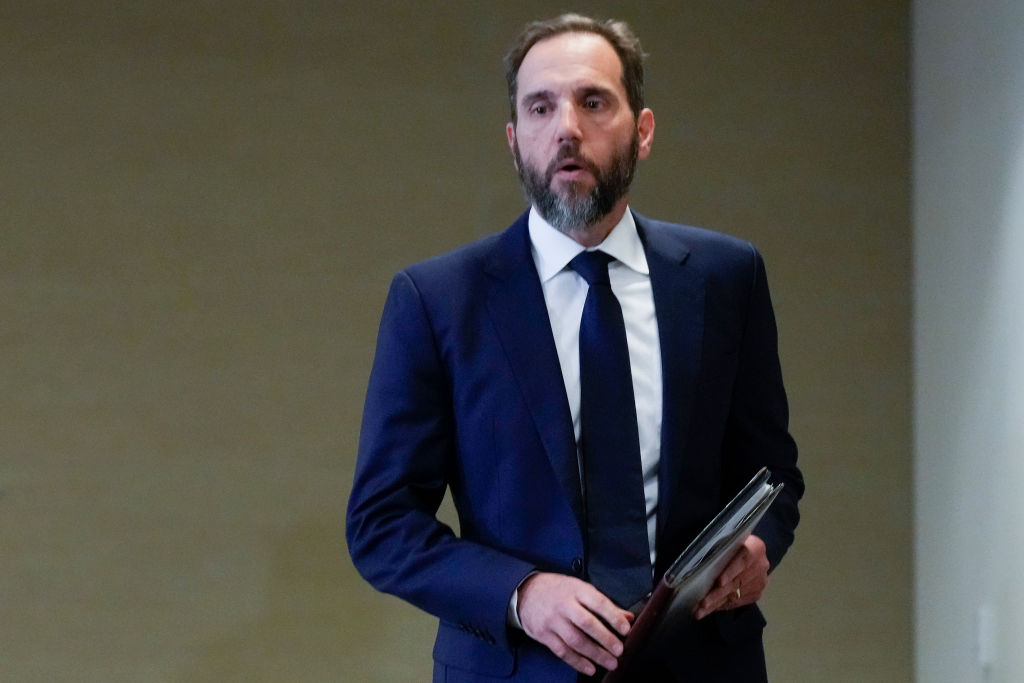Judge’s Attempt To Unseat Elon Musk and Save USAID Mirrors How Jack Smith Was Removed From Mar-a-Lago Case Against Trump
The special counsel and the world’s richest man have both been rebuked by courts for exercising power they were not authorized to wield.

The ruling by a district-level federal judge that the power exercised by the world’s richest man, Elon Musk, violates the Constitution’s Appointments Clause could create complications for the Department of Government Efficiency just as Special Counsel Jack Smith’s case against President Trump was felled for the same transgression.
Mr. Smith was disqualified from his Mar-a-Lago prosecution of Mr. Trump by Judge Aileen Cannon last summer after she determined that his hiring by Attorney General Garland could have violated the Appointments Clause, which ordains that all “principal officers of the United States” require nomination by the president and confirmation by the Senate. The Supreme Court has held that principal officers exercise “significant authority.”
The appointment of “inferior officers,” the Constitution commands, can be vested “in the President alone, in the Courts of Law, or in the Heads of Departments.” Judge Cannon determined that Mr. Smith, who was prosecuting war crimes relating to the Kosovo war when he was hired, has no more authority to prosecute Mr. Trump than would a private citizen.
The challenge to DOGE came in the form of a preliminary injunction with respect to the United States Agency for International Development from a federal district judge, Theodore Chuang, of Maryland.
Judge Chuang was appointed to the bench by President Obama and sparred with Mr. Trump multiple times during the president’s first term, repeatedly blocking his travel ban on foreigners from some Muslim countries and also blocking his rule making women pick up their own abortion pills from the pharmacy. In the Musk case, the request for an injunction came from some two dozen current and former DOGE employees. They were represented by a group led by a liberal lawyer, Norm Eisen.
Judge Chuang was persuaded enough by the argument that DOGE’s operations in dismantling USAID are “likely” unconstitutional. He ordered DOGE and Mr. Musk to refrain from taking any action relating to the shutdown of USAID. Mr. Musk last month declared that he “spent the weekend feeding USAID into the wood chipper.” Secretary Rubio announced last week that some 83 percent of USAID’s programs have been canceled.
Now comes Judge Chuang to rule that there is at least a plausible case to be made that all of this was undertaken in violation of the parchment. He sees DOGE’s work as possibly in violation of the bedrock principle of separated powers — USAID possesses statutory authorization — and Mr. Musk’s portfolio as amounting to that of an “officer of the United States,” but without the requisite confirmation by the Senate.
The Sun spoke to a legal scholar, Joshua Blackman, who argued for Mr. Smith’s disqualification before Judge Cannon. He explains that with respect to DOGE’s constitutionality — or lack thereof — “the devil will be in the details,” meaning the particulars of who is holding the chainsaw with respect to the decision-making and execution of DOGE’s agenda.

Judge Chuang reckons that the evidence presently favors the conclusion that “contrary to the defendants’ sweeping claim that Musk acted only as an advisor, Musk made the decisions to shutdown USAID’s headquarters and website even though he ‘lacked the authority to make that decision.’” Judge Chuang endorses “the conclusion that USAID has been effectively eliminated.”
Mr. Musk, Judge Chuang determines, “exercised significant authority reserved” for an officer of the United States “without having been duly appointed.” The White House insists that Mr. Musk is a mere “special government employee,” a role that is of limited duration. Judge Chuang finds that his “continuing” responsibilities mean that Mr. Musk “de facto” runs both DOGE and USAID, which he has worked “around the clock” to gut.
Judge Chuang acknowledges that Mr. Musk is not formally an “officer” in the constitutional sense, but writes: “If a president could escape Appointments Clause scrutiny by having advisers go beyond the traditional role of White House advisors … so as to bypass duly appointed officers, the Appointments Clause would be reduced to nothing more than a technical formality.”
The judge also reckons that adopting the position that Mr. Musk “has no formal legal authority relating to the decisions at issue, even if he is actually exercising significant authority on governmental matters, would open the door to an end-run around the Appointments Clause.” The Trump administration is likely to appeal to the Fourth United States Appeals Court.
Judge Cannon’s disqualification of Mr. Smith is still law in the Southern District of Florida after Mr. Trump dropped Mr. Smith’s appeal to the 11th United States Appeals Circuit. Although she ultimately decided the case on statutory grounds, her conclusion that Mr. Smith was a “private citizen” echoes Judge Chuang’s holding that DOGE “likely violated the United States Constitution in multiple ways.”
Mr. Musk’s position, though, is more unusual — the Supreme Court has on multiple occasions weighed the role of so-called independent prosecutors, usually judging them to be “inferior officers” who do not need Senate confirmation. Judge Cannon, though, ruled that at least one of those precedents was mere dictum, or unbinding on future courts.
In the case of USAID, the issue of authority could be potentially be remedied by Mr. Rubio stepping in and making the changes himself — a much easier passing of the baton than would have been involved in replacing Mr. Smith.

